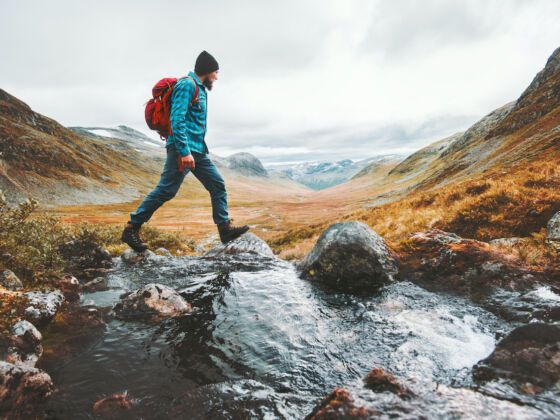ASK MOST ANY Manhattanite what their dream-home is, and they’ll tell you: “a one-bedroom apartment.” In a place where you’re rarely alone for more than a couple hours, being alone isn’t a problem — actually, it’s more expensive.
But whereas being alone in the city is a refuge, being alone in nature — truly alone, with no other person, no cell phone (okay, you can have a cell phone…) — is entirely different. You’re not recovering from overstimulation and mixing your life with thousands of others, but instead receding to the margins with a view of just one life (that would be yours).
And that’s where the following things will start to happen.
You’ll appreciate your insignificance.
Because you will feel small beneath trees, minuscule before oceans, and insignificant beneath an infinite expanse of space that mind is not capable of fully visualizing. And you should feel insignificant. Because you are. You are living, as Carl Sagan wrote, “on a mote of dust suspended in a sunbeam.”
But at the same time, the vastness of nature will comfort you. The fear of powerlessness and insignificance will fade as you turn your gaze inward to the universe’s worth of experience that exists within you — and realize that the infinity of what lies within is far grander than that outside.
You’ll understand your immense strength.
Because you will feel gigantic above insects and intelligent beyond measure as the only sentient being for miles. You will the feel the sand enveloping your feet, because they are the only feet on the entire beach. You will feel colossal even atop a mountain millions of times larger than you, because you know the mountain, for all its strength, will never stand on top of you.
And yet you will not feel dominance, but instead supreme responsibility — you are the only thing in this place that can ensure all is as it should be, not to mention the only thing that can truly screw it up. As you are alone with nature, it becomes less of a threat (as a thunderstorm in the city might be) and more of a close friend.
You’ll learn the value of silence.
Because you will feel uncomfortable with the silence — at first. There are no voices or other intelligence from which to validate anything you’re thinking — there is only the echo and response in your own head. And possibly your own mutterings to yourself, if it comes to it.
But as with all of life’s quietest moments, your subconscious will learn to speak softer. You will begin to listen and observe rather than endlessly think and evaluate — skills which, as you might imagine, often come in handy both in solitude and among others.
You’ll start holding yourself accountable.
You will blame only yourself when something goes wrong because there will only be yourself to blame. You left the water in the car. You locked yourself out of the car. You lost your footing and slipped down a rock quarry.
Bad things might happen, but you’ll move on even faster than you would have if you were not alone. You will skip the entire process of how you arrived upon this problem — because all that matters when you’re alone is the solution.
You’ll start trusting yourself.
Because you will not hesitate. You have no one to ask for advice, and no one to question your own. Should you risk surfing alone on a day like this? Maybe it’s worth it. Maybe it’s not. You’ll have to take risks — even the mere act of venturing alone into nature is a risk in itself. But risks are the measure of your sense of judgment — and how imperfect it truly is.
You’ll feel your vulnerability fade away.
Because the only person to feel vulnerable before is yourself. Feel self-conscious about your body? Take a short three-mile hike into the woods. There’s no force other than yourself that put you in the place you arrive. Sure, that might be an apt metaphor for any regrets or insecurities you might be feeling — but more literally, being alone gives you a greater self-awareness of yourself.
You’ll better understand your freedom.
Eventually, you will return from nature. And yet, it’s not so much a feeling of re-joining civilization and your loved ones, but leaving the place that you found yourself in alone — and on some level, leaving yourself to return to others.
In the end, this decision is what makes solo adventure in nature so fulfilling: You realize the weight of your freedom to make your own decisions, and regardless of whether they’re right or wrong, the important thing is that they were your own.
